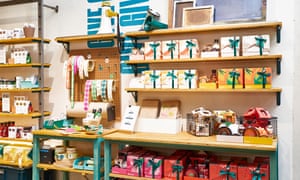[ad_1]
The Body Shop has opened a UK concept store that aims to mark a return to the activist roots of its late founder, the environmental and human rights campaigner Anita Roddick.
As well as a zone to encourage shoppers to become part of a collective of local campaigners, ideas being trialled in the central London outlet include a refill station – initially just for shower gels – which the ethical chain scrapped in the late 1990s after customers failed to understand how it worked.
The store is a refurbishment of the original 1,200 sq ft (111 sq metre) outlet opposite Bond Street tube station – the busiest of its 242-strong UK portfolio with strong footfall driven by office workers as well as tourists.

The Body Shop’s managing director, Linda Campbell, said the global beauty brand was hoping to revive the spirit of its founder, who died in 2007, with environmental and community-minded initiatives designed to put it back at the forefront of ethical business.
“We are reviving the idea of empowerment of girls and women, which is core to our business,” she said. “We will be encouraging shoppers to come up with ideas for how they can help their local communities.”
Tapping into growing consumer concern about the impact of single-use plastics on the environment, the Bond Street store will include a water station for customers to refill their bottles.
Most of the materials in the shop are upcycled, including till points rescued from landfill and stools made using reclaimed steel and recycled wood. The chain has also pledged to phase out wet wipes from all its stores by October.
Shoppers can also use a packaging return scheme to bring back empty bottles and containers from any brand, with the incentive of a £5 voucher when five are returned.

“Overall, the idea is for shoppers to have a bit of fun and to have some memorable experiences,” Campbell said. Some aspects of the pilot, if successful, are likely to be rolled out to other stores in Europe and North America.
Founded in 1976, the Body Shop started in Brighton selling 25 products. Customers were encouraged to recycle packaging – partly because Roddick did not have enough bottles at first – and there was an emphasis on natural ingredients that were ethically sourced and cruelty free.
There are about 800 products in the current range and the Body Shop has 3,000 stores in more than 60 countries. In the UK, it has just under 2,000 employees working in store, as well as an online operation and “At Home” service.
Roddick shocked observers in 2006 by selling up to L’Oréal, the world’s biggest cosmetics maker, but the chain was sold on in June 2017 to the Brazilian cosmetics company Natura in a deal thought to be worth £880m.
The company was defying the high street “gloom and doom”, Campbell said, with UK sales up by 4% year on year. Next year, the Body Shop is planning to open its first cash-free store in the refurbished Broadgate shopping centre in Liverpool Street station, London.
The chain’s highest-selling products are hemp hand cream and tea tree oil, with a tube and bottle of each being sold every nine and 17 seconds respectively.
[ad_2]
READ SOURCE


